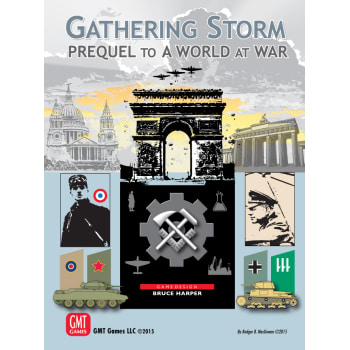Product Details
Gathering Storm, both a game in its own right and a prequel to GMT's A World at War, covers the period from 1935 to the outbreak of World War II, whenever that might be. Like A World at War, Gathering Storm, simulates the military, economic, political, diplomatic, research and production preparations for the Second World War, allowing the players to explore what might have happened if:
-Admiral Doenitz had convinced his superiors of the importance of submarine warfare in the impending war with Britain.
-Germany had pursued the Z Plan earlier and more consistently.
-The development of the "Ural bomber" had been pursued.
-Poland had become a German satellite, rather than resisting German aggression.
-War had broken out over the Sudetenland, or even the remilitarization of the Rhineland.
-Mussolini had given a lower priority to naval armaments, to the benefit of the Italian armor and air forces.
-France had extended the Maginot Line.
-de Gaulle's arguments to expand and strengthen France's armor units had been accepted.
-Britain had rearmed sooner.
-Russia had deferred the Great Purges. Or accelerated them.
-The Spanish civil war had been won by the Loyalists.
-A civil war had broken out in Yugoslavia. Or Greece.
-Atomic fission had been discovered earlier.
-The Second World War had begun with a Franco-Italian conflict. Or a French pre-emptive attack on Germany. Or a Russo-German war, with Italy and the Western Allies neutral.
-War comes early. Or later, in 1940 or even 1941.
-YOU had been in command.
Gathering Storm,can be played as a separate game in a single session, with its own victory conditions, but A World at War players will want to press on and see how the war they have created plays out. While using different mechanics, Gathering Storm,'s structure is consistent with A World at War and allows for a seamless transition to whatever alternate war the players planned - or stumbled into. Some 30 years in development, with three years of design and playtesting, Gathering Storm, includes the following:
-Six random events each turn, providing unlimited replay value.
-Economics based on tiles and activity counters, eliminating any paperwork.
-Flexible mobilization rules, allowing players to emphasis civilian or military production - each at the expense of the other.
-Unit construction which allows players to activate reserve units for immediate benefits, at a cost of limiting future options.
-Variable research, which can focus on air, naval, military or intelligence projects, as well as short or long term gains.
-A fast-moving diplomatic system, with each player allocating diplomatic counters each turn. Diplomatic targets are public, but the points allocated to them are not.
-Shipbuilding that allows varied fleets, including the possibility of 5-factor super battleships.
-Ahistorical A World at War counters, including armor units of different strengths and additional ships.
-A dynamic crisis system, in which the Allies can appease or oppose the Axis, with neither side necessarily being certain whether war might break out.
-No dice.
Contents:
- Approximately 1,000 die-cut counters
-
24 Maginot Line and West Wall hexagonal counters
-
One 22"x30" full-color Gathering Storm mapsheet
-
One 22"x30" A World at War map overlay
-
40-page Gathering Storm Rulebook
-
20-page A World at War conversion Rulebook
-
5 Scenario Cards
-
144 Random Event cards.
-
4 Russian purge cards
-
90 Point tiles
-
5 Tile racks
-
75 Activity counters
-
6 Player aid sheets
-
3 Research record sheets
